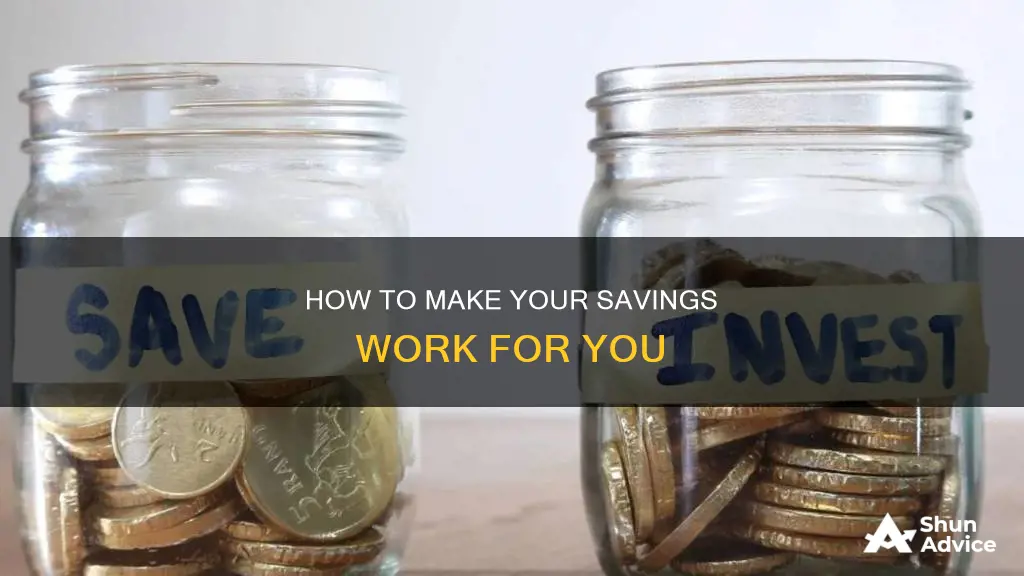
If you have excess savings, you may be wondering whether to invest the money or pay off debt. It's important to first ensure you have an emergency fund, then you could consider investing your excess cash in several different ways. Here are some options for how to use your excess savings:
- Pay off high-interest debt: Save on interest and free up monthly income by paying off any high-interest debt, such as credit cards.
- Boost your emergency fund: It's recommended to have enough money to cover your living expenses for at least three to six months.
- Increase retirement plan contributions: If your employer offers a 401(k) and matching contributions, your first goal should be to max out the amount your employer will match.
- Invest in a brokerage account: A brokerage account is a popular type of non-retirement investment account with no income restrictions or funding limits.
- Invest in a mutual fund or exchange-traded fund (ETF): Mutual funds and ETFs are great ways to build a diversified portfolio without picking individual stocks.
- Invest in real estate: Real estate investment trusts (REITs) are a more affordable way to add real estate to your portfolio.
What You'll Learn

Pay off high-interest debt
If you have excess savings, it's important to consider how to use that money to your benefit. One option is to pay off any high-interest debt. This can be a great way to free up more money each month and avoid costly interest charges. Here are some reasons why paying off high-interest debt is a good idea:
Save Money on Interest
Paying off high-interest debt first is a smart financial move because it saves you money in the long run. The higher the interest rate, the more expensive the debt is in the long run. By tackling the debt with the highest interest rate, you can reduce the overall cost of your debt. This is known as the debt avalanche method.
Free Up Monthly Income
When you pay off high-interest debt, you reduce the amount of money going out each month. This frees up your monthly income, giving you more financial flexibility and helping you build wealth. It can also improve your cash flow, allowing you to achieve other financial goals, such as buying a house or investing.
Improve Your Credit Score
Paying off high-interest debt, especially credit card debt, can have a positive impact on your credit score. Reducing your credit card balances lowers your credit utilization ratio, which is a key factor in determining your credit score. Lenders look at this ratio to assess how much of your available credit you're using. A lower credit utilization rate makes you a more attractive borrower and can lead to better loan terms and interest rates in the future.
Gain Quick Wins and Stay Motivated
The debt snowball method focuses on paying off the smallest debt balances first, regardless of the interest rate. This strategy provides quick wins and helps you stay motivated by seeing progress faster. As you pay off each debt, you'll feel a sense of accomplishment and be encouraged to continue on your debt-free journey.
Reduce Stress and Improve Quality of Life
Carrying high-interest debt can be stressful and impact your overall quality of life. By paying it off, you'll eliminate the worry associated with high-interest debt and gain peace of mind. This can lead to improved mental health and a sense of financial freedom.
Prioritize Your Financial Goals
When deciding whether to pay off high-interest debt, consider your financial goals and priorities. If you're aiming to save money, the debt avalanche method makes sense. However, if you're focused on improving your credit score or applying for a mortgage, paying off the highest balance first may be a better strategy.
In summary, paying off high-interest debt with your excess savings can be a wise financial decision. It saves you money on interest, improves your cash flow, boosts your credit score, and keeps you motivated on your debt repayment journey. Ultimately, the best strategy depends on your specific financial situation and goals, so be sure to evaluate your options and choose the approach that aligns with your priorities.
S-Corp Savings: Investing for Growth and Security
You may want to see also

Build an emergency fund
Building an emergency fund is a crucial part of any financial plan. The general rule of thumb is to have between three and six months' worth of household expenses saved up. This will help you prepare for unexpected events such as unemployment, illness, or home repairs.
- Set realistic goals: Rather than aiming for three months' worth of expenses right away, start with a smaller goal that feels more achievable. This could be one month's worth of expenses or even just two weeks'. Reaching this initial goal will give you the motivation to keep going.
- Start with small, regular contributions: Determine a contribution amount that you can commit to saving at regular intervals, such as per month, per week, or per paycheck. This will help you build a savings habit without stressing your cash flow.
- Automate your savings: Set up a separate account for your emergency fund and arrange for your chosen contribution amount to be deposited automatically by your employer or bank. This way, you won't be tempted to spend the money.
- Don't increase your spending: As your savings grow, avoid the temptation to increase your monthly spending or take on new credit card debt. Instead, if you find you have extra money left over each month, consider increasing your savings contribution.
- Don't oversave: Remember that an emergency fund is meant to be easily accessible. Once you've reached your savings goal, stop contributing to this account and start directing your savings towards retirement accounts or other investments.
- Balance debt and savings: If you're paying off high-interest loans or credit cards, it's important to balance your savings goals with your debt repayment. You don't want the interest on your debt to cancel out the returns on your savings. Consider setting a more modest initial emergency fund goal and focus on paying off your debt, then adjust as needed.
- Find ways to economize: Look for areas where you can cut back on spending to contribute to your emergency fund. This could include buying a less expensive car, downgrading your cell phone plan, cutting back on dining out, or skipping a vacation.
- Where to keep your emergency fund: It's recommended to keep your emergency fund in a separate account from your regular bank to avoid the temptation to spend it. Consider a high-yield savings account or a money market account, which offer higher interest rates than traditional savings accounts.
Planning Savings and Investments: Strategies for Financial Freedom
You may want to see also

Invest in stocks, bonds, or real estate
Investing excess savings in stocks, bonds, or real estate is a great way to make your money work for you. Here are some detailed strategies to consider:
Investing in stocks:
- Individual stocks: Research and invest in individual companies that you believe will perform well in the future. This approach allows you to back specific businesses and industries that align with your interests and values.
- Index funds: Consider investing in index funds such as the S&P 500, which tracks the performance of 500 large US companies. Index funds offer diversification and lower risk compared to individual stocks.
- Robo-advisors: If you don't want to actively pick stocks, robo-advisors use algorithms to build and manage an investment portfolio for you. This option typically comes with a fee, but it can provide a hands-off approach to stock investing.
Investing in bonds:
- Treasury bonds: Buying Treasuries, or government bonds, can provide a guaranteed rate of return when held to maturity. This option is generally considered low risk, especially if you're investing in bonds from stable governments.
- Bond funds: You can invest in bond funds, which are similar to mutual funds but focus on bonds. These funds offer diversification by pooling your money with other investors to purchase a variety of bonds.
Investing in real estate:
- Direct property investment: You can invest directly in real estate by purchasing income-producing properties, such as rental homes or commercial spaces. This approach allows you to benefit from potential capital appreciation and rental income.
- Real Estate Investment Trusts (REITs): REITs are companies that own or finance income-producing real estate. They offer an easier way to invest in real estate, as you can buy shares of REITs on stock exchanges within your IRA or taxable brokerage account.
Remember, investing in stocks, bonds, or real estate comes with different levels of risk and potential returns. It's essential to assess your financial situation, risk tolerance, and investment goals before making any decisions.
Condo Conundrum: Save or Invest?
You may want to see also

Increase retirement plan contributions
If you have excess savings and are wondering what to do with it, investing it in a retirement plan is often a good idea. Here are some reasons why you should consider increasing your retirement plan contributions:
- It can help you reduce your taxable income. Pre-tax contributions to your retirement plan are taken directly from your gross salary and are only taxed upon withdrawal. This means you can benefit from paying lower income taxes during your working years.
- Many employers offer to match your contributions up to a certain percentage of your salary. By increasing your contributions to at least that percentage, you can take full advantage of this benefit. Otherwise, you may be leaving free money on the table.
- Social Security income may not be enough to cover all your expenses in retirement. Increasing your retirement plan contributions can help boost your savings and ensure a more financially secure future.
- Even small increases in your contributions, such as 1% annually, can make a significant difference in the long term due to compound interest and time in the market.
- If you are in a good financial position and have excess funds, investing in a retirement plan can be a better option than keeping the money in a savings account, as it has the potential to grow more in the market.
When deciding whether to increase your retirement plan contributions, it is important to consider your age, financial situation, and any career or lifestyle changes you may be experiencing. It is also essential to review your contributions and retirement goals regularly, as your circumstances and requirements may change over time.
Savings or Investing: Where Should Your Money Go?
You may want to see also

Invest in yourself
Investing in yourself is one of the best investments you can make with your excess savings. This could mean saving for your education or that of a family member. A 529 plan is a tax-advantaged investment vehicle that facilitates tax-free growth as long as the funds are used for qualified educational expenses.
If you have entrepreneurial dreams, you can use your excess cash to jump-start your business and turn your dreams into reality. Using extra cash will reduce the number of business loans you may need as you start and grow your company.
You can also use your excess savings to boost your existing investments. Try to contribute at least 10-15% of your pre-tax salary each year to your retirement accounts. If you've already maxed out your contributions, consider opening or adding funds to other investment accounts, such as a health savings account (HSA), brokerage account, or automated investing account.
It's important to find a balance between being financially responsible and using your money to improve your quality of life. So, while it's great to look for ways to build wealth with your excess money, it's also okay to spend some of it on yourself.
CDs: Macroeconomics Investment or Savings Strategy?
You may want to see also
Frequently asked questions
It depends on your financial situation and goals. If you have high-interest debt, it's generally recommended to pay that off first. You should also ensure you have an emergency fund with enough money to cover your living expenses for at least three to six months. If you've done these things and have excess savings, investing is a great option to make your money work harder for you.
You could invest in a brokerage account, increase contributions to a 401(k), 403(b), or IRA, or invest in a mutual fund or exchange-traded fund (ETF).
Investing can help your assets outpace inflation, so your money doesn't lose value over time. It can also help you achieve your financial goals, such as saving for retirement or other long-term goals.
Yes, investing does come with risks. The value of your investments can decrease, and you may lose some or all of your investment. It's important to do your research and understand the risks involved before investing.







